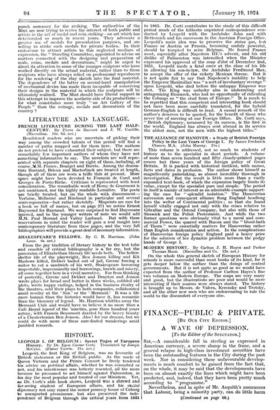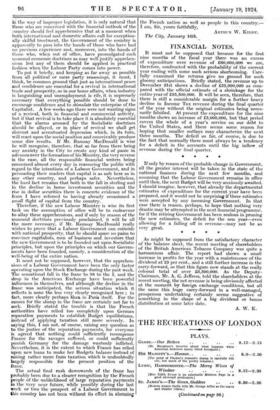FINANCE—PUBLIC & PRIVATE.
[BY OUR CITY EDITOR.]
A WAVE OF DEPRESSION.
[To the Editor of the SPECTATOR.] SIR,—A considerable fall in sterling as expressed in American currency, a severe slump in the franc, and a general relapse in high-class investment securities have been the outstanding features in the City during the past week. Nor in considering these unfavourable develop- ments is much comfort to be gained from the fact that, on the whole, it may be said that the developments have been on almost exactly the lines which might have been predicted, and, indeed, that they have been pretty much according to " programme." Nevertheless, and in site of Mr. Asquith's assurances that Labour, being a minority party, can do little harm (Continued on page 96.) lii the way of improper legislation, it is only natural that those who are concerned with the financial outlook of the country should feel apprehensive that at a moment when both international and domestic affairs call for exception- ally skilful treatment, the Government of the country is apparently to pass into the hands of those who have had no previous experience and, moreover, into the hands of those who, when out of office, have promulgated such unsound economic doctrines as may well justify apprehen- sions lest any of them should be applied in practical fashion when the Labour Party comes into power. To put it briefly, and keeping as far away as possible from all political or mere party reasonings, it must, I think, be common ground that just as international peace and confidence are essential for a revival in international trade and prosperity, so in our home affairs, when industry is languishing and unemployment is rife, it is supremely necessary that everything possible should be done to encourage confidence and to stimulate the enterprise of the Capitalist. A few weeks ago there were not wanting signs of a revival, both in financial and commercial activity, but if that revival is to take place it is absolutely essential that the alarms aroused by the Socialistic doctrines should be allayed, or in place of revival we shall get distrust and accentuated depression which, in its turn, will react upon the social position and conceivably produce some dire results. If Mr. Ramsay MacDonald is wise he will recognize, therefore, that so far from there being any anxiety in the City to create any kind of panic in advance over the formation of his Ministry, the very reverse is the case, all the responsible financial writers being concerned almost every day in reassuring the public with regard to the intentions of a Labour Government, and in persuading their readers that capital is as safe here as in any other country, and perhaps safer. Nevertheless, the hard fact remains that both in the fall in sterling and in the decline in • home investment securities and the rise in dollar securities there is concrete evidence of the fears I have referred to having already occasioned a small flight of capital from the country. Therefore, if the new Labour Ministry is wise its first task on the assumption of office will be to endeavour to allay these apprehensions, and if only by reason of the unsound doctrines previously proclaimed, it will be all the more necessary, if Mr. Ramsay MacDonald really wishes to prove that a Labour Government can coincide with national prosperity, that he should spare no pains to convince capitalists, men of business and _ investors that the new Government is to be founded not upon Socialistic principles, but upon the principles on which our Govern- ments have been founded, namely, a consideration of the well-being of the entire nation. It must not be supposed, however, that the apprehen- sions of a Labour Government have been the only factor operating upon the Stock Exchange during the past week. The sensational fall in the franc to 98 to the and the drop in the American Exchange have been powerful influences in themselves, and although the decline in the franc was anticipated, the serious situation which it reflects is none the less very clearly recognized here ; in fact, more clearly perhaps than,- in Paris itself. For the causes for the slump in the franc are certainly not far to seek. Briefly stated the trouble is that the French authorities, have relied too completely upon German reparation payments to establish• Budget equilibriums, Instead of applying taxation still more severely.. In saying thii, I am not, of course, raising any question as to the justice of the reparation payments, for everyone is agreed that nothing could sufficiently recompense France for the ravages suffered, or could sufficiently punish Germany for the damage wantonly inflicted. Nevertheless, it is the extent to which France has relied upon, new loans to make her Budgets balance instead of raising rather more from taxation which is undoubtedly largely responsible for the present position of the franc.
The actual final rush downwards of the franc has probably been due to a clearer recognition by the French people of the unlikelihood ,of large reparation payments the very near future, While possibly during the last week or two the prospect of a Labour Government in Sins country has not been without its effect in alarming the French nation as well as people in this country.— The City, lanuaky 16th.
ARTHUR W. KIDDY.











































 Previous page
Previous page